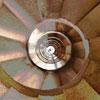Shedding Light On Proportion And Principles
 by James Allen
by James Allen
LIGHT ON THE SENSE OF PROPORTION
In a nightmare there is no relation of one thing to another; all things are haphazard, and there is a general confusion and misery. Wise men have likened the self-seeking life to a nightmare. There is a close resemblance between a selfish life, in which the sense of proportion is so far lost that things are only seen as they affect one’s own selfish aims, and in which there are feverish excitements and overwhelming troubles and disasters, and that state of troubled sleep known as nightmare.
In a nightmare, too, the controlling will and perceiving intelligence are asleep; and in a selfish life the better nature and spiritual perceptions are locked in profound slumber.
The uncultivated mind lacks the sense of proportion. It does not see the right relation of one natural object to another, and is thereafter dead to the beauty and harmony with which it is surrounded.
And what is this sense of proportion but the faculty of seeing things as they are! It is a faculty which needs cultivating, and its cultivation, when applied to natural objects, embraces the entire intelligence and refines the moral character. It enters, however, into spiritual things as well as things natural, and here is more lacking, and more greatly needed. For to see things as they are in the spiritual sphere is to find no ground for grief, no lodging place for lamentation.
Whence spring all this grief and anxiety, and fear and trouble? Is it not because things are not as men and women wish them to be? Is it not because the multiplicity of desires prevents them from seeing things in their true perspective and right proportion?
When one is overwhelmed with grief, he sees nothing but his loss; its nearness to him blots out the whole view of life. The thing in itself may be small, but to the sufferer it assumes a magnitude which is out of proportion to the surrounding objects of life.
All who have passed the age of thirty can look back over their lives at times when they were perplexed with anxiety, overwhelmed with grief, or even, perhaps, on the verge of despair, over incidents which, seen now in their right proportion, are known to be very small.
If the would-be suicide will today stay his hand and wait, he will at the end of ten years marvel at his folly over so comparatively small a matter.
When the mind is possessed by passion or paralyzed with grief, it has lost the power of judgment. It cannot weigh and consider. It does not perceive the relative values and proportions of the things by which it is disturbed. Awake and acting, it yet moves in a nightmare which holds its faculties in thrall.
The passionate partisan lacks a sense of proportion to such an extent that, to him, his own side or view appears all that is right and good, and his opponent’s all that is bad and wrong. To this partiality his reason is chained, so that whatever reason he may bring to bear upon the matter is enlisted in the service of bias, and is not exercised in order to find the just relation which exists between the two sides. He is so convinced that his own party is all right, and the other, equally intelligent party is all wrong, that it is impossible for him to be impartial and just. The only thing he understands as justice is that of getting his own way, or placing some ruling power in the hands of his party.
Just as the sense of proportion in things material puts an end to the spirit of repugnance, so in things spiritual it puts an end to the spirit of strife. The true artist does not see ugliness anywhere; he sees only beauty. That which is loathsome to others fills, to him, its rightful place in nature, and it appears in his picture as a thing of beauty. The true seer does not see evil anywhere; he sees universal good. That which is hateful to others, he sees in its rightful place in the scheme of evolution, and it is held dispassionately in his mind as an object of contemplation.
Men and women worry, and grieve, and fight because they lack this sense of proportion, because they do not see things in their right relations. The objects of their turbulence are not things-in-themselves, but their own opinions about things, self-created shadows, the unreal creations of an egoistic nightmare.
The cultivation and development of the ethical sense of proportion converts the heated partisan into a gentle peacemaker, and gives the calm and searching of the prophet to the hitherto blind instrument in the clashing play of selfish forces.
The spiritual sense of proportion gives sanity; it restores the mind to calmness; it bestows impartiality and justice and reveals a universe of faultless harmony.
 LIGHT ON ADHERENCE TO PRINCIPLE
LIGHT ON ADHERENCE TO PRINCIPLE
The man of truth never departs from the divine principles which he has espoused. He may be threatened with sickness, poverty, pain, loss of friends and position, yea, even with immediate death, yet he does not desert the principles which he knows to be eternally true. To him, there is one thing more grievous, more to be feared and shunned than all the above evils put together, and that is – the desertion of principle. To turn coward in the hour of trial, to deny conscience, to join the rabble of passions, desires, and fears in turning upon, accusing, and crucifying the Eternal Christ of Divine Principle, because, forsooth, that principle has not given him personal health, affluence and ease – this, to the man of Truth, is the evil of evils, the sin of sins.
We cannot escape sickness and death. Though we avoid them for a long time, in the end they will overtake us. But we can avoid wrongdoing, we can avoid fear and cowardice. When we habitually avoid wrongdoing and cast out fear, the evils of life will not subdue us when they overtake us, for we shall have mastered them. Instead of avoiding them for a season we shall have conquered them on their own ground.
There are those that teach that it is right to do wrong when the wrong is to protect another; that it is good, for instance, to tell a lie when its object is the well-being of another – that is, that it is right to desert a principle of truthfulness under severe trial.
Such teaching has never emanated from the lips of the Great Teachers. It has not been uttered even by those lesser, yet superbly noble men, the prophets, saints and martyrs, for those divinely illuminated men knew full well that no circumstance can make a wrong a right, and that a lie has no saving and protective power. Wrongdoing is a greater evil than pain, and a lie is more deadly and destructive than death. Jesus rebuked Peter for trying to shield his Master’s life by wrongdoing, and no right-minded person would accept life at the expense of the moral character of another when it appeared possible to do so.
All men admire and revere the martyrs, those steadfast men and women who feared wrong, cowardice, and lying, but who did not fear pain and death; those who were steadfast and calm in their adherence to principle even when brought to the utmost extremity of trial. Yea, even when the taunts and jeers of enemies assailed them, and the tears and agonies of loved ones appealed to them, they flinched not nor turned back, knowing that the future good and salvation of the whole world depended upon their firmness in that supreme hour. For this, they stand through all time as monuments of virtue, centers of saving, and uplifting power for all humankind.
But he who lied to save himself, or for the sake of the two or three beings whom he personally loved, is rarely heard of, for in the hour of desertion of principle, his power was gone. If he is heard of, he is not loved for that lie. He is always looked upon as one who fell when the test was applied; as an example of the highest virtue he is rejected by all men in all times.
Had all men believed that an untruth was right under extreme circumstances, we should have had no martyrs and saints, the moral fiber of humanity would have been undermined, and the world left to grope in ever deepening darkness.
The attitude which regards wrongdoing for the sake of others as the right thing to do is based on the tacit assumption that wrong and untruth are inferior evils to unhappiness, pain, and death. But the man of moral insight knows that wrong and untruth are the greater evils, and so he never commits them, even though his own life or the lives of others appear to be at stake.
It is easy for a man in the flowery time of ease or the heyday of prosperity to persuade himself that he is staunchly adhering to principle. But when pain overtakes him, when the darkness of misfortune begins to settle down upon him, and the pressure of circumstances hems him in – then he is on his trial, and has come to the testing time. In that season it will be brought to light whether he clings to self or adheres to Truth.
Principles are for our salvation in the hour of need. If we desert them in that hour, how can we be saved from the snares and pains of self?
If a man does wrong to his conscience, thinking thereby to avoid some immediate or pressing pain, he does not but increase pain and evil. The good man is less anxious to avoid pain than wrongdoing.
There is neither wisdom nor safety in deserting permanent and protective principles when our happiness seems to be at stake. If we desert the true for the pleasant, we shall lose both the pleasant and the true. But if we desert the pleasant for the true, the peace of truth will soothe away our sorrow.
If we barter the higher for the lower, emptiness and anguish will overtake us, and then, having abandoned the Eternal, where is our rock of refuge? But if we yield up the lower for the higher, the strength and satisfaction of the higher will remain with us, fullness of joy will overtake us, and we shall find in truth a rock of refuge from the evils and sorrows of life.
To find the permanent amid all the changes of life, and, having found it, adhere to it under all circumstances – this only is true happiness, this only is salvation and lasting peace.
Excerpt from Light On Life’s Difficulties
Posted in Other Topics, Spiritualitywith no comments yet.






Leave a Reply